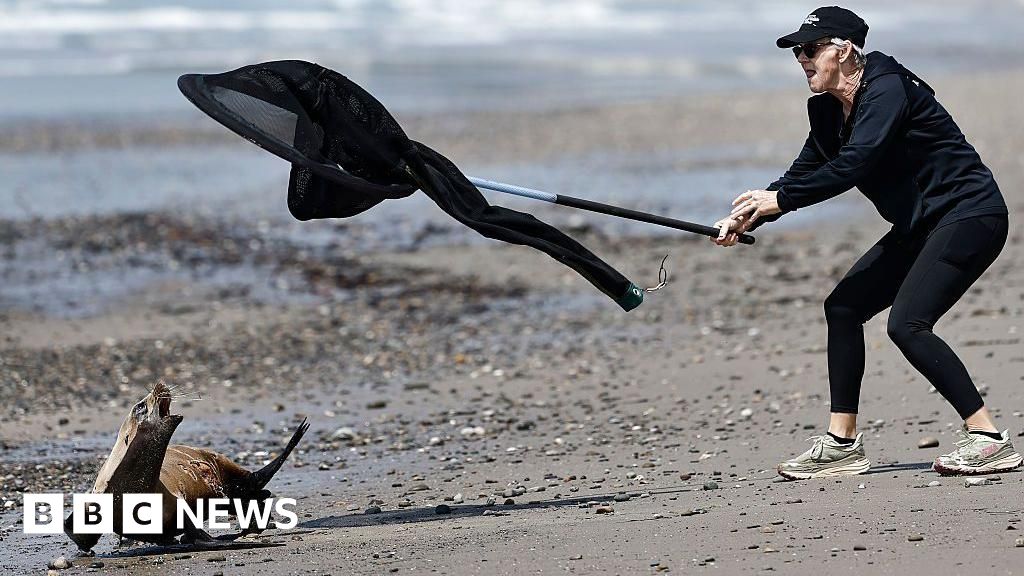For 20 years, Rj LaMendola found peace while paddling in the water on his surfboard.
But last month off the coast of Southern California, the ocean turned hostile after a sea lion lunged at him, bit him and dragged him off his board.
“It looked possessed,” Mr LaMendola wrote in a Facebook post, saying the animal involved in the encounter just north of Los Angeles was “feral, almost demonic”.
The surfer later learned the animal was suffering from domoic acid toxicosis- a neurological condition caused by a harmful algal bloom. It’s one of dozens of sickened animals that have been spotted across California beaches recently – many suffering from symptoms like seizures or intense lethargy. The toxin often leads to death.
This particular algae bloom has appeared four years in a row across California, raising concerns it might be turning into an annual event. The bloom of algae started earlier than normal this year and has spread roughly 370 miles of the iconic Southern California coastline.
When Mr LaMenolda made it to shore, his wetsuit ripped open, he was bleeding and went to the hospital. “It felt like I was being hunted,” he said.
South of where he was attacked, 15-year-old Phoebe Beltran was doing a swim test in Long Beach to become a lifeguard when a sea lion repeatedly bit her.
“I was just so scared, so shocked, but I still felt the immense pain on my arms, like, over and over again,” the teen told local US media.
The two back-to-back attacks have garnered global headlines and caused some anxiety among those who call California and its iconic beaches home. While attacks are rare, experts say the number of animals sickened by the toxic algae bloom appears to be increasing.
John Warner, CEO of the Marine Mammal Care Center in Los Angeles – which is treating sea life sickened by the bloom – told the BBC these animals aren’t “naturally aggressive or actually attack people” but the toxins impact their behaviour.
“These animals are reacting to the fact that they are sick,” he explained. “They’re disoriented, and most likely, most of them are having seizures, and so their senses are not all fully functional as they normally would and they’re acting out of fear.”
Domoic acid builds up in smaller fish like sardines and anchovies, which are eaten by marine predators such as dolphins, seals and sea lions in large quantities, causing them to get sick.
Exposure to the acid causes serious neurological issues in sea lions, including seizures, disorientation and a telltale head-tilting behaviour known as “stargazing.”
Some animals fall into a lethargic and comatose state, while others can turn aggressive.
“Their behaviour changes from what we’re used to, to something more unpredictable,” Mr Warner said. “But in this particular bloom, we’re seeing them really comatose and rather taken out by this toxin.”
The Marine Mammal Care Center is currently overwhelmed with the influx and severity of sick animals.
According to Mr Warner, the nonprofit has admitted at least 195 sea lions from Feb 20 to the end of March. During the same time frame last year, the centre saw only 50 of the animals.
If treated promptly, sea lions have a 50% to 65% chance of recovery, but Mr Warner says the centre is running out of space and money to treat the animals. Treatment includes anti-seizure medication and sedation, followed by twice-daily tube feeding and hydration.
On top of that, the recovery pace this year has been slower, he said.
While sick sea lions in 2023 typically began eating within a week, many this year are still lethargic five weeks into care.
Recovery comes in stages: from a comatose state to disorientation, then aggressive reawakening—when the animals are most dangerous due to lingering neurological effects.
Adult sea lions can weigh hundreds of pounds, and aggressive behaviors make housing them complicated. If their behaviour doesn’t normalize, it could signal permanent brain damage, and humane euthanasia becomes necessary.
“If they’re still aggressive or not foraging properly, it tells us their brains aren’t functioning the way they should,” Mr Warner said.
For now, beachgoers are urged to stay well away from stranded animals – at least 50 feet – and resist the temptation to intervene.
“These are still the same charismatic, really fun-to-watch expert cuddle puddlers that we see along the coast all the time,” Mr Warner said. “We need to remember they are wild animals. They can be unpredictable even in normal circumstances.”

